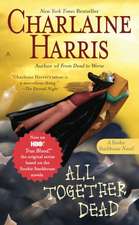The Woman in White
Autor Wilkie Collins Editat de Matthew Sweeten Limba Engleză Paperback – 26 feb 2003
The original 'sensation novel',The Woman in Whiteopens with Walter Hartright's eerie encounter with a strange, solitary woman on a moonlit London road. Engaged as a drawing master to the beautiful Laura Fairlie, Walter becomes embroiled in the sinister intrigues of Sir Percival Glyde and his 'charming' friend Count Fosco, who has a taste for white mice, vanilla bonbons and poison. Pursuing questions of identity and insanity along the corridors of English country mansions and the madhouse, this is the first and most influential of the Victorian genre that combined Gothic horror with psychological realism.
Edited with an Introduction and Notes by Matthew Sweet
| Toate formatele și edițiile | Preț | Express |
|---|---|---|
| Paperback (50) | 26.27 lei 3-5 săpt. | +17.75 lei 6-10 zile |
| HarperCollins Publishers – oct 2011 | 26.27 lei 3-5 săpt. | +17.75 lei 6-10 zile |
| Wordsworth Editions – 31 dec 2007 | 34.60 lei 3-5 săpt. | +14.94 lei 6-10 zile |
| Alma Books COMMIS – 31 dec 2015 | 48.60 lei 3-5 săpt. | +21.49 lei 6-10 zile |
| Real Reads – 13 noi 2011 | 50.44 lei 3-5 săpt. | +5.98 lei 6-10 zile |
| Bantam Classics – 31 mar 1985 | 51.52 lei 3-5 săpt. | |
| Vintage Books USA – 3 oct 2007 | 53.05 lei 23-34 zile | +25.89 lei 6-10 zile |
| Penguin Books – 26 feb 2003 | 53.58 lei 23-34 zile | +26.78 lei 6-10 zile |
| Oxford University Press – 17 apr 2008 | 54.02 lei 10-16 zile | +27.55 lei 6-10 zile |
| Penguin Books – 28 noi 2012 | 54.06 lei 23-34 zile | +27.62 lei 6-10 zile |
| HarperCollins Publishers – 25 oct 2022 | 56.04 lei 3-5 săpt. | +26.36 lei 6-10 zile |
| CreateSpace Independent Publishing Platform – | 82.33 lei 3-5 săpt. | |
| CREATESPACE – | 88.42 lei 3-5 săpt. | |
| CreateSpace Independent Publishing Platform – | 110.51 lei 3-5 săpt. | |
| CREATESPACE – | 125.04 lei 3-5 săpt. | |
| CREATESPACE – | 126.70 lei 3-5 săpt. | |
| CreateSpace Independent Publishing Platform – 26 noi 2015 | 141.08 lei 3-5 săpt. | |
| West Margin Press – 21 oct 2020 | 146.59 lei 3-5 săpt. | |
| CreateSpace Independent Publishing Platform – 26 noi 2015 | 148.88 lei 3-5 săpt. | |
| CREATESPACE – | 160.58 lei 3-5 săpt. | |
| CreateSpace Independent Publishing Platform – | 169.74 lei 3-5 săpt. | |
| CreateSpace Independent Publishing Platform – | 170.74 lei 3-5 săpt. | |
| CREATESPACE – | 172.82 lei 3-5 săpt. | |
| – | 177.71 lei 3-5 săpt. | |
| – | 179.37 lei 3-5 săpt. | |
| CREATESPACE – | 190.01 lei 3-5 săpt. | |
| – | 216.08 lei 3-5 săpt. | |
| Hansebooks – 28 iun 2016 | 234.86 lei 3-5 săpt. | |
| – | 107.97 lei 6-8 săpt. | |
| CREATESPACE – | 115.87 lei 6-8 săpt. | |
| – | 119.16 lei 6-8 săpt. | |
| CreateSpace Independent Publishing Platform – | 120.41 lei 6-8 săpt. | |
| Digireads.com – 8 mai 2017 | 141.29 lei 6-8 săpt. | |
| SMK Books – 21 dec 2008 | 150.65 lei 6-8 săpt. | |
| – | 157.73 lei 6-8 săpt. | |
| – | 162.39 lei 6-8 săpt. | |
| CREATESPACE – | 162.67 lei 6-8 săpt. | |
| – | 163.25 lei 6-8 săpt. | |
| Throne Classics – 26 mai 2019 | 167.70 lei 38-44 zile | |
| – | 173.72 lei 6-8 săpt. | |
| – | 176.83 lei 6-8 săpt. | |
| – | 180.09 lei 6-8 săpt. | |
| – | 180.09 lei 6-8 săpt. | |
| Book Jungle – 13 mar 2009 | 189.50 lei 6-8 săpt. | |
| SC Active Business Development SRL – 29 noi 2017 | 197.79 lei 38-44 zile | |
| Simon & Brown – 28 feb 2011 | 248.86 lei 38-44 zile | |
| Antiquarius – 25 oct 2020 | 294.98 lei 38-44 zile | |
| Hesperides Press – 31 dec 2005 | 299.47 lei 38-44 zile | |
| Simon & Brown – 30 sep 2011 | 301.56 lei 38-44 zile | |
| Simon & Brown – 25 oct 2018 | 328.82 lei 38-44 zile | |
| Simon & Brown – 12 noi 2018 | 353.58 lei 38-44 zile | |
| Hardback (10) | 83.09 lei 3-5 săpt. | +13.67 lei 6-10 zile |
| Pan Macmillan – 8 feb 2018 | 83.09 lei 3-5 săpt. | +13.67 lei 6-10 zile |
| Penguin Books – 30 sep 2009 | 131.47 lei 3-5 săpt. | +34.02 lei 6-10 zile |
| Mint Editions – 6 oct 2020 | 214.67 lei 3-5 săpt. | |
| Throne Classics – 26 mai 2019 | 254.27 lei 38-44 zile | |
| SMK Books – 3 apr 2018 | 286.61 lei 6-8 săpt. | +97.06 lei 6-10 zile |
| – | 302.32 lei 38-44 zile | |
| Simon & Brown – 18 oct 2011 | 361.33 lei 38-44 zile | |
| Simon & Brown – 25 oct 2018 | 380.56 lei 38-44 zile | |
| Antiquarius – 25 oct 2020 | 387.90 lei 38-44 zile | |
| Simon & Brown – 12 noi 2018 | 401.74 lei 38-44 zile |
Preț: 53.58 lei
Preț vechi: 60.39 lei
-11% Nou
10.25€ • 11.17$ • 8.64£
Carte disponibilă
Livrare economică 04-15 aprilie
Livrare express 18-22 martie pentru 36.77 lei
Specificații
ISBN-10: 0141439610
Pagini: 720
Dimensiuni: 138 x 200 x 32 mm
Greutate: 0.49 kg
Editura: Penguin Books
Colecția Penguin Classics
Locul publicării:London, United Kingdom
Notă biografică
Descriere
An embattled inheritance, accusations of madness, scheming villainy and much more tie into the labyrinthine plot of one of the most celebrated and sensational novels of the Victorian era." A young man just beginning a new job in London meets with a strange woman on a moonlit road, offers her assistance getting into the city and then finds she may have just escaped an asylum. Hidden connections are unveiled between the family that employs the young man and the mysterious woman, pulling the reader into a suspenseful web of plots within plots, theft, betrayal, mistaken identities and attempted murder. Punctuating his dramatic narrative with sharp suspense and sudden moments of revelation that provide shock and understanding in equal measure, Wilkie Collins was pioneer of the literary thriller. In 1859, when serialized in Charles Dickens magazine, All the Year Round, crowds lined up to buy each installment of The Woman in White. Modern readers will be grateful to have the entire text at hand as the author's remarkable storytelling skills retain their power to ensnare, enchant and keep the pages turning toward the unpredictable conclusion. With an eye-catching new cover, and professionally typeset manuscript, this edition of The Woman in White is both modern and readable.
Caracteristici
Recenzii
Extras
The Narrative of Walter Hartright, of Clemant's Inn, London
IT WAS the last day of July. The long hot summer was drawing to a close; and we, the weary pilgrims of the London pavement, were beginning to think of the cloud-shadows on the corn-fields, and the autumn breezes on the sea-shore.
For my own poor part, the fading summer left me out of health, out of spirits, and, if the truth must be told, out of money as well. During the past year, I had not managed my professional resources as carefully as usual; and my extravagance now limited me to the prospect of spending the autumn economically between my mother's cottage at Hampstead, and my own chambers in town.
The evening, I remember, was still and cloudy; the London air was at its heaviest; the distant hum of the street-traffic was at its faintest; the small pulse of the life within me and the great heart of the city around me seemed to be sinking in unison, languidly and more languidly, with the sinking sun. I roused myself from the book which I was dreaming over rather than reading, and left my chambers to meet the cool night air in the suburbs. It was one of the two evenings in every week which I was accustomed to spend with my mother and my sister. So I turned my steps northward, in the direction of Hampstead.
Events which I have yet to relate, make it necessary to mention in this place that my father had been dead some years at the period of which I am now writing; and that my sister Sarah, and I, were the sole survivors of a family of five children. My father was a drawing-master before me. His exertions had made him highly successful in his profession; and his affectionate anxiety to provide for the future of those who were dependent on his labours, had impelled him, from the time of his marriage, to devote to the insuring of his life a much larger portion of his income than most men consider it necessary to set aside for that purpose. Thanks to his admirable prudence and self-denial, my mother and sister were left, after his death, as independent of the world as they had been during his lifetime. I succeeded to his connexion, and had every reason to feel grateful for the prospect that awaited me at my starting in life.
The quiet twilight was still trembling on the topmost ridges of the heath; and the view of London below me had sunk into a black gulf in the shadow of the cloudy night, when I stood before the gate of my mother's cottage. I had hardly rung the bell, before the house-door was opened violently; my worthy Italian friend, Professor Pesca, appeared in the servant's place; and darted out joyously to receive me, with a shrill foreign parody on an English cheer.
On his own account, and, I must be allowed to add, on mine also, the Professor merits the honour of a formal introduction. Accident has made him the starting-point of the strange family story which it is the purpose of these pages to unfold.
I had first become acquainted with my Italian friend by meeting him at certain great houses, where he taught his own language and I taught drawing. All I then knew of the history of his life was, that he had once held a situation in the University of Padua; that he had left Italy for political reasons (the nature of which he uniformly declined to mention to anyone); and that he had been for many years respectably established in London as a teacher of languages.
Without being actually a dwarf-for he was perfectly well-proportioned from head to foot-Pesca was, I think, the smallest human being I ever saw, out of a show-room. Remarkable anywhere, by his personal appearance, he was still further distinguished among the rank and file of mankind, by the harmless eccentricity of his character. The ruling idea of his life appeared to be, that he was bound to show his gratitude to the country which had afforded him an asylum and a means of subsistence, by doing his utmost to turn himself into an Englishman. Not content with paying the nation in general the compliment of invariably carrying an umbrella, and invariably wearing gaiters and a white hat, the Professor further aspired to become an Englishman in his habits and amusements, as well as in his personal appearance. Finding us distinguished, as a nation, by our love of athletic exercises, the little man, in the innocence of his heart, devoted himself impromptu to all our English sports and pastimes, whenever he had the opportunity of joining them; firmly persuaded that he could adopt our national amusements of the field, by an effort of will, precisely as he had adopted our national gaiters and our national white hat.
I had seen him risk his limbs at a fox-hunt and in a cricket-field; and, soon afterwards, I saw him risk his life, just as blindly, in the sea at Brighton. We had met there accidentally, and were bathing together. If we had been engaged in any exercise peculiar to my own nation, I should, of course, have looked after Pesca carefully; but, as foreigners are generally quite as well able to take care of themselves in the water as Englishmen, it never occurred to me that the art of swimming might merely add one more to the list of manly exercises which the Professor believed that he could learn impromptu. Soon after we had both struck out from shore, I stopped, finding my friend did not gain on me, and turned round to look for him. To my horror and amazement, I saw nothing between me and the beach but two little white arms, which struggled for an instant above the surface of the water, and then disappeared from view. When I dived for him, the poor little man was lying quietly coiled up at the bottom, in a hollow of shingle, looking by many degrees smaller than I had ever seen him look before. During the few minutes that elapsed while I was taking him in, the air revived him, and he ascended the steps of the machine with my assistance. With the partial recovery of his animation came the return of his wonderful delusion on the subject of swimming. As soon as his chattering teeth would let him speak, he smiled vacantly, and said he thought it must have been the Cramp.
When he had thoroughly recovered himself and had joined me on the beach, his warm Southern nature broke through all artificial English restraints, in a moment. He overwhelmed me with the wildest expressions of affection-exclaimed passionately, in his exaggerated Italian way, that he would hold his life, henceforth, at my disposal-and declared that he should never be happy again, until he had found an opportunity of proving his gratitude by rendering me some service which I might remember, on my side, to the end of my days. I did my best to stop the torrent of his tears and protestations, by persisting in treating the whole adventure as a good subject for a joke; and succeeded at last, as I imagined, in lessening Pesca's overwhelming sense of obligation to me. Little did I think then-little did I think afterwards when our pleasant Brighton holiday had drawn to an end-that the opportunity of serving me for which my grateful companion so ardently longed, was soon to come; that he was eagerly to seize it on the instant; and that, by so doing, he was to turn the whole current of my existence into a new channel, and to alter me to myself almost past recognition.
Yet, so it was. If I had not dived for Professor Pesca, when he lay under water on his shingle bed, I should, in all human probability, never have been connected with the story which these pages will relate-I should never, perhaps, have heard even the name of the woman, who has lived in all my thoughts, who has possessed herself of all my energies, who has become the one guiding influence that now directs the purpose of my life.
Chapter Two
Pesca's face and manner, on the evening when we confronted each other at my mother's gate, were more than sufficient to inform me that something extraordinary had happened. It was quite useless, however, to ask him for an immediate explanation. I could only conjecture, while he was dragging me in by both hands, that (knowing my habits) he had come to the cottage to make sure of meeting me that night, and that he had some news to tell of an unusually agreeable kind.
We both bounced into the parlour in a highly abrupt and undignified manner. My mother sat by the open window, laughing and fanning herself. Pesca was one of her especial favourites; and his wildest eccentricities were always pardonable in her eyes. Poor dear soul! from the first moment when she found out that the little Professor was deeply and gratefully attached to her son, she opened her heart to him unreservedly, and took all his puzzling foreign peculiarities for granted, without so much as attempting to understand any one of them.
My sister Sarah, with all the advantages of youth, was, strangely enough, less pliable. She did full justice to Pesca's excellent qualities of heart; but she could not accept him implicitly, as my mother accepted him, for my sake. Her insular notions of propriety rose in perpetual revolt against Pesca's constitutional contempt for appearances; and she was always more or less undisguisedly astonished at her mother's familiarity with the eccentric little foreigner. I have observed, not only in my sister's case, but in the instances of others, that we of the young generation are nothing like so hearty and so impulsive as some of our elders. I constantly see old people flushed and excited by the prospect of some anticipated pleasure which altogether fails to ruffle the tranquillity of their serene grandchildren. Are we, I wonder, quite such genuine boys and girls now as our seniors were, in their time? Has the great advance in education taken rather too long a stride; and are we, in these modern days, just the least trifle in the world too well brought up?
Without attempting to answer those questions decisively, I may at least record that I never saw my mother and my sister together in Pesca's society, without finding my mother much the younger woman of the two. On this occasion, for example, while the old lady was laughing heartily over the boyish manner in which we tumbled into the parlour, Sarah was perturbedly picking up the broken pieces of a teacup, which the Professor had knocked off the table in his precipitate advance to meet me at the door.
"I don't know what would have happened, Walter," said my mother, "if you had delayed much longer. Pesca has been half-mad with impatience; and I have been half-mad with curiosity. The Professor has brought some wonderful news with him, in which he says you are concerned; and he has cruelly refused to give us the smallest hint of it till his friend Walter appeared."
"Very provoking: it spoils the Set," murmured Sarah to herself, mournfully absorbed over the ruins of the broken cup.
While these words were being spoken, Pesca, happily and fussily unconscious of the irreparable wrong which the crockery had suffered at his hands, was dragging a large arm-chair to the opposite end of the room, so as to command us all three, in the character of a public speaker addressing an audience. Having turned the chair with its back towards us, he jumped into it on his knees, and excitably addressed his small congregation of three from an impromptu pulpit.
"Now, my good dears," began Pesca (who always said "good dears," when he meant "worthy friends"), "listen to me. The time has come-I recite my good news-I speak at last."
"Hear, hear!" said my mother, humouring the joke.
"The next thing he will break, mamma," whispered Sarah, "will be the back of the best arm-chair."
"I go back into my life, and I address myself to the noblest of created beings," continued Pesca, vehemently apostrophising my unworthy self, over the top rail of the chair. "Who found me dead at the bottom of the sea (through Cramp); and who pulled me up to the top; and what did I say when I got into my own life and my own clothes again?"
"Much more than was at all necessary," I answered, as doggedly as possible; for the least encouragement in connexion with this subject invariably let loose the Professor's emotions in a flood of tears.
"I said," persisted Pesca, "that my life belonged to my dear friend, Walter, for the rest of my days-and so it does. I said that I should never be happy again till I had found the opportunity of doing a good Something for Walter-and I have never been contented with myself till this most blessed day. Now," cried the enthusiastic little man at the top of his voice, "the overflowing happiness bursts out of me at every pore of my skin, like a perspiration; for on my faith, and soul, and honour, the Something is done at last, and the only word to say now, is-Right-all-right!"
It may be necessary to explain, here, that Pesca prided himself on being a perfect Englishman in his language, as well as in his dress, manners, and amusements. Having picked up a few of our most familiar colloquial expressions, he scattered them about over his conversation whenever they happened to occur to him, turning them, in his high relish for their sound and his general ignorance of their sense, into compound words and repetitions of his own, and always running them into each other, as if they consisted of one long syllable.
"Among the fine London houses where I teach the language of my native country," said the Professor, rushing into his long-deferred explanation without another word of preface, "there is one, mighty fine, in the big place called Portland. You all know where that is? Yes, yes-course-of-course. The fine house, my good dears, has got inside it a fine family. A Mamma, fair and fat; three young Misses, fair and fat; two young Misters, fair and fat; and a Papa, the fairest and the fattest of all, who is a mighty merchant, up to his eyes in gold-a fine man once, but seeing that he has got a naked head and two chins, fine no longer at the present time. Now mind! I teach the sublime Dante to the young Misses, and ah!-my-soul-bless-my-soul!-it is not in human language to say how the sublime Dante puzzles the pretty heads of all three! No matter-all in good time-and the more lessons the better for me. Now mind! Imagine to yourselves that I am teaching the Young Misses to-day, as usual. We are all four of us down together in the Hell of Dante. At the Seventh Circle-but no matter for that: all the Circles are alike to the three young Misses, fair and fat,-at the Seventh Circle, nevertheless, my pupils are sticking fast; and I to set them going again, recite, explain, and blow myself up red-hot with useless enthusiasm, when-a creak of boots in the passage outside, and in comes the golden Papa, the mighty merchant with the naked head and the two chins.-Ha! my good dears, I am closer than you think for to the business, now. Have you been patient, so far? or have you said to yourselves, 'Deuce-what-the-deuce! Pesca is long-winded to-night?' "




















